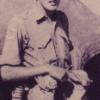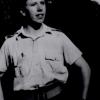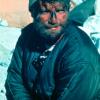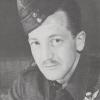Born 12 September 1911.
Died North Africa, 8 March 1943.
Hooker.
Newport High School 1927.
Welsh Secondary Schools 1926,1927.
Newport R.F.C 1928 - 1937 (Capt. 1935 - 37).
Barbarians 1935, 1936.
Wales v England 1934, (Capt. 1934).
Chiltern R.F.C 1929/1930.
John Raymond Evans joined Chiltern R.F.C. at the start of 1929/30 season, while working as a clerk for Lloyds Bank, Chesham, having recently been transferred from their branch at Newport.
He must have wondered what he had let himself in for when he found himself playing for the local rugby club in front of the loyal few at the Pineapple ground, after the thousands of supporters who watched him play at Newport.
The first game he played in was against West Herts, which was also the first of Chiltern's 1929/30 season. His obvious talent as a front row forward had prevailed in the trial game the week before but was ignored so he was selected to play at wing forward. A week later, against Thames Valley at Maidenhead, common sense took over and he was selected as hooker; he also took all the penalty kicks and conversions. The game the following week was against Upper Clapton, where he again scored freely.
John managed to score over fifty points in his first three games. He played his last game for Chiltern against R.A.F. Halton in the New Year before returning to Newport in February 1930 and managed to play five games for the Newport 1st XV before the end of the season.
He established himself a season later as a senior player with Newport, playing over a hundred and fifty 1st XV games before 1938, which included two seasons (1935 to 1937) as the club's captain.
In 1934 he was selected as captain of Wales against England at Cardiff, his only cap. ‘Giff' Newton, the Chiltern skipper at the time of the International match, sent him a telegram wishing him luck and reminding him of his days spent at Chiltern. England won by three tries, nine points to nil.
His brief International career was a rare moment in Welsh rugby history in that he was one of only four Welsh Internationals ever to captain the side on his debut game. John always insisted the reason behind this was that he was the only Welsh player in the side that could speak both Welsh and English.
He was also a member of the unbeaten Barbarians' Easter tour of 1935.
Following a brief career move with the Forestry Commission to the Gold Coast of Africa, John returned to the UK around the time of a military recruiting drive, and immediately signed up with the South Wales Borderers.
When The Parachute Regiment started to call for volunteers he was naturally first in line, eventually serving as a Lieutenant with the 3rd Battalion Parachute Regiment in North Africa, during 1942/43.
John parachuted into Bone, Algeria in late 1942, with the 3rd Para Bn to capture the airfield. This turned out to be an uneventful exercise but he was later mortally wounded in the preliminary skirmishes around Sedjenane, which led up to the major battle of Tamera, Tunisia, North Africa.
Major Alan Bush, a 1934 Oxford rugby Blue who had played against John in a Major Stanley's XV, was his company commander in the 3rd Para Bn.
The forward position at the road was at the base of a wooded slope and was exposed to attack from higher ground, which was bound to come. Reluctantly, Major Bush turned to John and ordered him to take over the position, knowing that he could rely on him to hold the position and not call for help before it was needed.
The attack came in early morning on the 8th March, a fine spring morning. A crescendo of noise suddenly erupted, indicating the battle had commenced at very close quarters. The exposed platoon held their ground and the reserves were quickly dispatched to reinforce the position and quickly succeeded in driving off the attack. It was at this point that John, in the defence of his position, with his ever present pipe in his mouth, was killed instantly by a sniper with a single shot to the head.
Major Bush recalled "It was when we reached the defensive position that I saw the dead. The injuries to our dead were gruesome, and at the time it was the general opinion that the attackers had used Dum Dum bullets. In a fleeting moment my immediate thoughts were that I remembered John's acceptance of the orders I had reluctantly given to him, the most horrible job I have ever ordered. He had received them as a challenge with a spirited glint in his eye, a visible reluctance, as much to say ‘If you insist’.
He had not been the best of Regimental officers, for in him was too much of the rebel, too much individuality in his great body for that, yet some instinct made him always respond rightly and immediately to the needs of the occasion. I would miss him - the naughty glint in his eye when he recalled an escapade following an International rugby match. Thoughts lingered for many days until my initial sadness was dispelled".
John’s batman, Jocky Allen, recalled that "He was not the typical officer. On route marches he would sing ‘We will keep the red flag flying high’ and would turn up at the pub and have drinking contests with members of his platoon - no one could beat him. His platoon would follow him anywhere and did so when action was called for".
In the action when John was killed, it turned out that the platoon found the German sniper that had fired the fatal shot. He had already been wounded and was apparently wearing Red Cross arm bands. The sniper was carried to an ambulance on the main road that was collecting the wounded. A few moments later there was a direct hit on the ambulance and it burst into flame, burning alive all its inhabitants.
John was initially given a field burial near to where he fell and now lies in the Tabarka Ras Rajel war cemetery, Tunisia, along with his fellow paratroopers.
By Roger Cook
Read More




Latest Comments
There are currently no comments for this content.
Add Comment
In order to add comments you must be registered with ParaData.
If you are currently a ParaData member please login.
If you are not currently a ParaData member but wish to get involved please register.